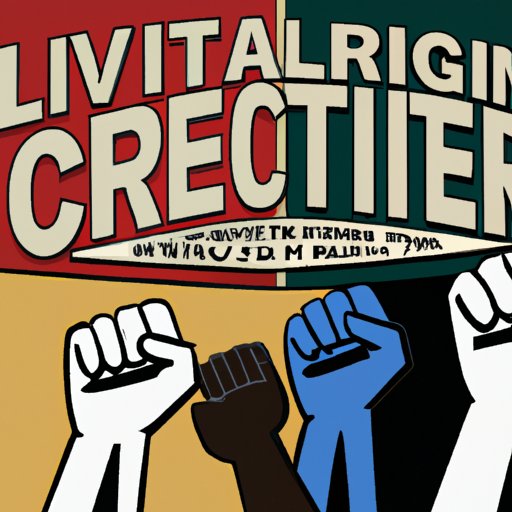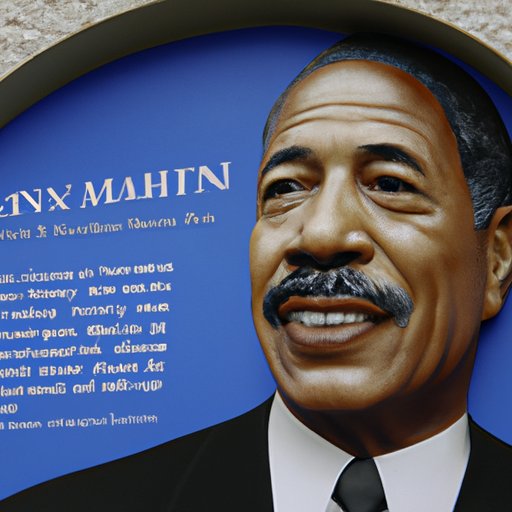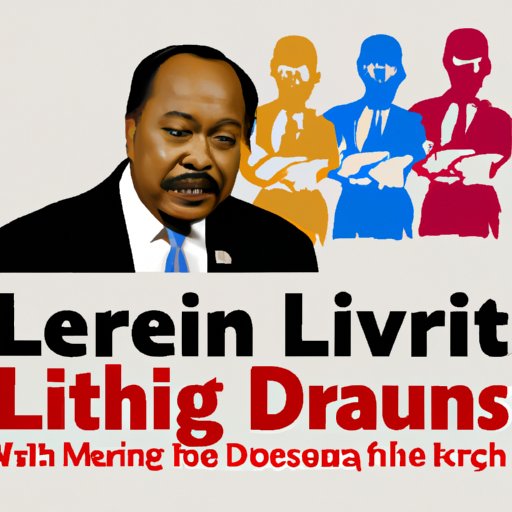Introduction
Leadership is defined as the ability to guide or direct others to accomplish a common goal. Leaders are often viewed as role models who inspire others to take action and make positive changes in the world. One such leader who has had a remarkable impact on society is Martin Luther King Jr. He was an American Baptist minister and civil rights activist who led the Civil Rights Movement in the 1950s and 1960s.

Overview of Martin Luther King Jr. and His Civil Rights Movement
Martin Luther King Jr. was born in Atlanta, Georgia in 1929. He was heavily influenced by his father, who was also a Baptist minister. In 1955, he was part of a boycott against segregated buses in Montgomery, Alabama that lasted 381 days. This event sparked the beginning of the Civil Rights Movement which sought to end racial segregation and discrimination against African Americans. Throughout his career, Martin Luther King Jr. promoted nonviolent protest tactics, such as boycotts, sit-ins, and marches, to achieve equal rights for all people.

Impact of the Civil Rights Movement on Society Today
The Civil Rights Movement led by Martin Luther King Jr. had a lasting impact on society today. It resulted in the passing of several important laws, including the Civil Rights Act of 1964 and the Voting Rights Act of 1965, which outlawed racial segregation and gave African Americans the right to vote. These laws have helped create a more equitable society, where people of all races are treated with dignity and respect.
The Civil Rights Movement also increased awareness of civil rights issues. People began to recognize the importance of equality and justice for everyone, regardless of race or gender. This has led to further progress in the area of civil rights, including the passage of anti-discrimination laws, the expansion of voting rights, and the protection of other human rights.

Leadership Skills of Martin Luther King Jr.
Martin Luther King Jr. possessed many leadership qualities that enabled him to lead the Civil Rights Movement successfully. He was a visionary thinker who was able to look beyond the present and envision a more equitable future. He was also able to inspire others with his words and deeds, motivating them to take action in pursuit of justice and equality.
King also used strategic nonviolent tactics to achieve his goals. He believed that peaceful protests were more effective than violence in bringing about meaningful change. He taught people the power of nonviolence and how it could be used to confront injustice and oppression.
Different Approaches to Peaceful Protesting
Martin Luther King Jr. also advocated for different approaches to peaceful protesting. He encouraged collaboration with other activists to create a unified front for change. He also respected opposing views and worked to find common ground between those who disagreed. He also understood the power of media and utilized it to spread his message of peace and justice.
Speeches and Writings Used to Inspire Others
In addition to his leadership skills, Martin Luther King Jr. was also known for his inspiring speeches and writings. His most famous speech was the “I Have a Dream” address in 1963, which called for an end to racism and urged people to come together in pursuit of equality. He also wrote the Letter from Birmingham Jail in response to criticism of his nonviolent tactics. Other major addresses include his Nobel Peace Prize acceptance speech and his “Beyond Vietnam” speech.

Relating His Legacy to Current Civil Rights Issues
Today, Martin Luther King Jr.’s legacy continues to live on. His teachings are still relevant and can be applied to current civil rights issues. His message of equality and justice is just as important now as it was then. People continue to fight for equal rights and strive to create a more inclusive society.
King’s legacy also emphasizes the need for unity among all people. He believed that only through understanding and cooperation could true progress be made. He taught us that we must strive to work together to create a better world for everyone.
Highlighting Courage and Resilience
Martin Luther King Jr. was a leader who exemplified courage and resilience in the face of adversity. He stood up for what he believed in, even when it meant facing opposition. He faced numerous threats and arrests throughout his career, but he never wavered in his commitment to justice and equality for all.
Showcasing the Importance of Compromise and Respect
Martin Luther King Jr. was also a firm believer in compromise and respect. He recognized the importance of working together to achieve a common goal. He taught us that we must be willing to listen to opposing viewpoints in order to find solutions that benefit everyone.
He also respected diversity and acknowledged the value of different backgrounds and experiences. He believed that by embracing our differences, we can create a more harmonious society.
Conclusion
Martin Luther King Jr. was an exemplary leader whose legacy continues to have an impact today. He was a visionary thinker who inspired others with his speeches and writings. His leadership skills enabled him to lead the Civil Rights Movement successfully, utilizing nonviolent tactics and respecting opposing views. He emphasized the importance of unity among all people and showed us the power of compromise and respect.
His legacy reminds us of the need to continue the fight for justice and equality for all. We should strive to follow in his footsteps and create a better world for ourselves and future generations.
(Note: Is this article not meeting your expectations? Do you have knowledge or insights to share? Unlock new opportunities and expand your reach by joining our authors team. Click Registration to join us and share your expertise with our readers.)
